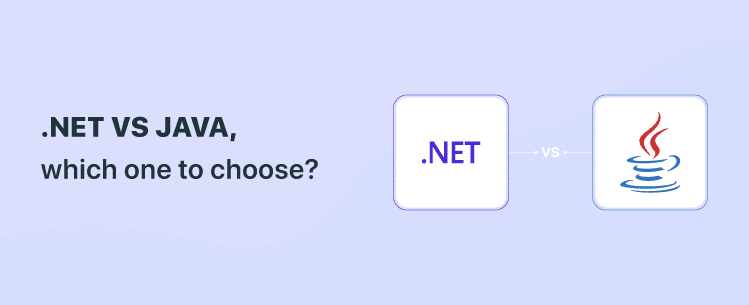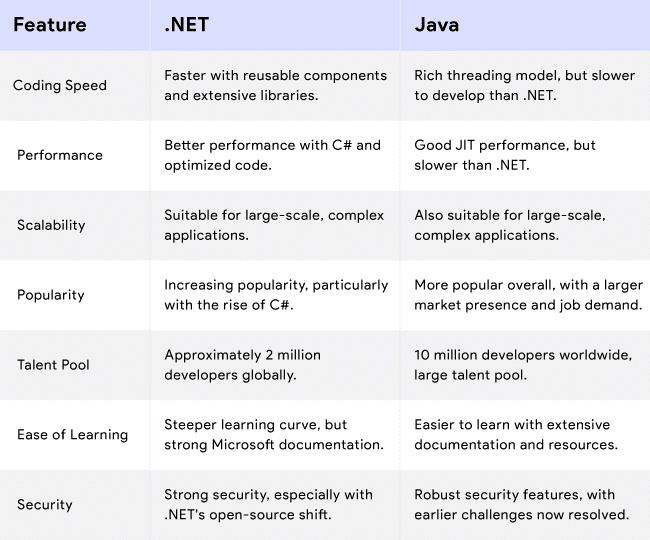
Quick Summary:
There is often a battle between .NET and Java. Even though Java is a programming language and .NET is, in many ways, a framework, many standards treat them as if they were the same thing.
Java and Net are often pitted against one another, and their battle dates back many years. Both languages have their benefits, so choosing one takes some careful consideration. Both technologies allow for large programs with almost equivalent user-friendly features and dynamic experiences.
Choosing a programming language might be difficult since so many have emerged as the IT industry continues to welcome new technology. In this blog, we will compare .Net and Java to determine which is best suited for your business.
What is .NET?
Microsoft’s. NET framework is one of the most popular and versatile in the industry. It’s a hub where programmers can build any app—web, mobile, desktop, or Internet of Things—from the ground up. A virtual computer that can build and execute code in various languages, including C# and VB.Net. Dot NET is widely used for developing GUI programs, online programs, and web services. It’s feature-rich and up to par with industry norms. In general,.NET streamlines the software development process by giving programmers access to a single, unified platform on which they may solve a wide range of problems.
Features of .NET:
- CLR:
Common Intermediate Language (CIL) is the intermediate language into which all.NET programming languages are compiled. This translation layer is not an interpreter but a JIT compiler that generates native code on the fly. Common Language Infrastructure (CLI) is the collective name for this setup.
- One framework, many languages:
A Common Type System (CTS) is part of .NET and defines all legal data types, structures, and interactions between them. That’s why .NET can handle languages like C#, F#, and Visual Basic, among others, for creating applications.
- Security:
Different levels of trust are assigned to managed components depending on several factors, including where they were sourced (the Internet, a corporate network, or a local computer). A developer may use this to determine whether a managed component performs file, registry access, or other potentially dangerous operations.
- Management of Automatic Resources:
The .NET CLR automatically manages memory, network connections, database connections, and other related issues. Memory used by objects at runtime is allocated and freed through calls to native methods, removing the programmer’s burden of memory management.
- Library of Core Classes:
All languages that run on the .NET Framework have access to the BCL-type library. Classes in the BCL cover many frequently used operations, including working with files and images, communicating with databases, processing XML and JSON, etc.
- Profiling and issue fixing
Visual Studio and Visual Studio Code are examples of IDEs that may be used to create and troubleshoot.NET programs. The framework provides in-depth information for debugging and profiling and integrates seamlessly with a wide range of IDEs. This allows us to investigate the program’s efficiency and spot bugs during runtime.
What is Java?
Java is popular because of its speed, stability, and adaptability. It’s a base for creating apps on various hardware and operating systems. Java is widely used in many contexts, including desktop applications, online and mobile apps, graphical user interfaces, game development, and embedded devices.
Java is used in everything from computers and smartphones to televisions and washing machines. It streamlines the creation of web-based applications like survey generators, online banking software, and shopping carts. Java was developed using C and C++ and a compiler to turn Java source code into the machine language the Java Virtual Machine (JVM) needs.
Features of Java
- Object-Oriented
Since Java is an Object Oriented Programming Language, everything in it is defined by classes and objects. So, what is an Object, exactly? The object is a concrete entity that stands for anything from a person to a place to a thing and can be distinguished from other objects. The neighboring objects all have matching states and behaviors.
- Secure:
Security has become more important in modern software. Now that everything is connected online, hacking is a real concern. Furthermore, we need security for our Java-based application. Java also provides safety measures for developers to use.
- Simple:
Java is simple and easy to learn since it does not have the complexities of other programming languages. Since Java had to run on devices with limited memory and resources, its developers strove for simplicity. Java. Java has the same syntax as C and C++; thus, developers who switch to Java won’t have to relearn syntax.
- Portable
Java’s portability stems from its platform-independent nature and the WORA (Write Once, Run Anywhere) principle. Java has enabled developers to write code once and run it identically on several computers. Because JVM and bytecode are to blame for this.
- Not Dependent on Platform
Unlike languages like C, C++, etc., which must be converted into platform-specific machines before they can be run, Java is considered platform agnostic since it can be written once and run everywhere. A platform is any computing system, hardware, or software on which an application may run. There are both software-based and hardware-based systems available. Java provides a software infrastructure.
- Simplified deployment:
Various application packaging options are available to developers depending on where their software will be used.
.NET vs. Java: key distinctions

Several significant differences exist between the.NET and Java frameworks, two widely used languages for creating software. One notable distinction between Java and.NET is that the former is renowned for supporting several platforms, while the latter is known for supporting multiple languages.
The following are some of the most significant distinctions between Java and.NET:
.NET vs Java: Coding Speed
When developers opt for Java, they benefit from a rich threading model that simplifies the sequencing and management of instructions. However, the .NET framework often takes the lead in terms of pure speed. Thanks to its object-oriented nature, .NET offers a wide array of reusable components, significantly reducing development time. When comparing the time required to develop identical applications in both languages, hiring a .NET development company can enable faster delivery due to these reusable assets.
.NET vs. Java: Performance
Which language delivers better performance? While Java is equipped with numerous tools for scalability, it doesn’t quite match the speed of the .NET framework. This performance gap is largely due to. NET’s reliance on memory-efficient languages like C#. .NET also excels in code optimization, producing more compact, high-performing code that’s easier to maintain and debug. Although Java has made strides with Just-In-Time (JIT) compiler optimizations, which can sometimes outpace .NET, overall, .NET still holds the edge in performance. it might be beneficial to hire a Java developer who specializes in performance optimization to leverage Java’s full capabilities.
.NET vs Java: Scalability
Both .NET and Java are robust enough to handle large-scale, complex applications, making them suitable for enterprise-level development. Choosing .NET or Java often comes down to the specific needs of the project and the team’s preferences. Both technologies are widely implemented in large-scale systems and can scale effectively.
.NET vs. Java: Cross-Platform Capabilities
Cross-platform functionality allows software to run on multiple operating systems, including macOS, Windows, Linux, and Solaris. Historically, .NET was limited in this regard, but both .NET and Java now offer cross-platform capabilities. Both frameworks can operate across various environments today, making them versatile choices for development teams.
.NET vs Java: Integrated Development Environment (IDE)
The right Integrated Development Environment (IDE) can significantly enhance productivity by streamlining coding, testing, documentation, and debugging. Java is highly flexible and works well with multiple IDEs, such as Eclipse, IntelliJ IDEA, Oracle NetBeans, and Oracle JDeveloper. These tools offer a variety of built-in add-ons to improve the development process. In contrast, .NET developers typically use Visual Studio or VS Code, which are tailored to the language and provide a seamless development experience.
.NET vs. Java: Popularity
When it comes to popularity, Java has the upper hand. Java developers are in higher demand, partly due to the language’s long-standing presence in the industry. Searching job listings on platforms like Indeed reveals a greater demand for Java specialists than .NET developers. However, the rise of C# has slightly narrowed this gap, increasing interest in. NET.
.NET vs. Java: Community Support
Java, which has existed since the 1990s, boasts a large and active community of developers who readily share their knowledge and expertise. .NET, which emerged in the 2000s and was influenced by Java, has a smaller community by comparison. Nonetheless, NET’s user base is growing, and the community is becoming increasingly vibrant, offering ample developer support.
.NET vs. Java: Talent Pool
There are approximately 10 million Java developers globally compared to around 2 million .NET developers. This difference is also reflected within organizations, where Java tends to have a larger presence. At companies like SaM Solutions, the Java community is significantly bigger, providing a broader talent pool for Java-based projects.
.NET vs Java: Ease of Learning
Both .NET and Java have steep learning curves. Still, Java has a slight advantage due to its extensive documentation and educational resources due to its larger and longer-established user base. While .NET hasn’t yet achieved the same level of recognition, Microsoft’s comprehensive documentation and learning materials continue to attract new developers to the framework.
.NET vs. Java: Security
Both .NET and Java offer robust security features. Java initially faced challenges with some of its security mechanisms, but these issues have been addressed over time. Today, Java provides enhanced security measures, making it less prone to mistakes that could lead to significant vulnerabilities. .NET, which was once more secure due to its closed-source nature, has evolved to maintain strong security practices even as it has become more open.
.NET vs Java: Cost of Development
In terms of salary, a Java developer with 4-6 years of experience in the United States earns an average of $112,440 per year, while a .NET developer with similar experience makes around $114,503 annually. These figures can vary depending on location, additional technical skills, years of experience, and company tenure. Despite these variations, the development cost remains relatively comparable between the two technologies.
.NET Vs Java: License
.NET is a free, open-source platform with no licensing fees and free development tools for Linux, Windows, and macOS. This includes compilers, libraries, and programming languages, all of which are open-source and available at no cost, even for commercial applications.
In contrast, since its April 2019 update, Java has offered versions like Java 8, 9, 10, 11, and 14 for free, but only for personal use and development. Any commercial use of these versions requires the purchase of a commercial license. For Java SE, a subscription is necessary to access certain products.
.NET Vs Java: Market Overview
Google Trends
The graph below shows the number of queries asked for both .net and Java in the past five years. As of 18 March 2023, there were an average of 85 queries for Java and 12 for dot NET.
.Net, Java – Explore – Google Trends
Market Share
The diagram below shows the usage statistics of .NET vs JAVA as per W3tech.
ASP .NET: 7.2% of all server-side programming languages use ASP.NETand 9.7% of the top 1,000,000 websites use it.
JAVA: Java powers 4.7% of all websites, and 4.8% of the top 1,000,000 sites employ Java.
.NET Vs Java: Time To Market
The scale of your project plays a crucial role in determining the speed of development. Factors like easily accessible libraries, comprehensive documentation, third-party APIs, and a large pool of skilled developers can significantly accelerate your time-to-market. Anything that helps you avoid writing code from scratch is generally advantageous. Java and .NET offer comparable code integration and reusability capabilities, allowing for efficient development processes.
.NET VS JAVA: Which One To Choose?

When to Choose Java:
Creating platform-independent applications: Java’s cross-platform capabilities make it ideal for developing software that runs seamlessly on various operating systems.
Building large-scale, distributed systems: Java excels in scalability and performance, making it suitable for complex, enterprise-level applications.
Leveraging a vast ecosystem: Use Java’s extensive libraries and frameworks, such as Spring and Hibernate, to accelerate development and enhance functionality.
Developing Android mobile applications: Java is a primary language for Android development, offering strong community support and rich resources.
Utilizing robust multithreading and concurrency: Java’s powerful support for multithreading and concurrency is essential for building high-performance, responsive applications.
When to Choose .NET:
Building Windows-centric applications: If you focus on developing applications tightly integrated with Microsoft technologies, .NET is the way to go.
Developing enterprise web applications with ASP.NET: .NET provides a secure, scalable framework for building robust enterprise-level web applications.
Employing the power of C#: C# in .NET allows for rapid application development with a strong focus on productivity and maintainability.
Creating desktop applications: Use.NET’s WPF or WinForms to build sophisticated Windows desktop applications.
Integrating with Microsoft technologies: .NET is the preferred choice when working within the Microsoft ecosystem, ensuring seamless integration and support.
Wrapping it up
Deciding between .NET and Java all comes down to what the project calls for. Dot NET is a reliable option if you need to create Windows-based apps that work with Microsoft’s other services and tools. It supports various languages and has tight interoperability with the rest of Windows. However, Java is still a strong candidate if your priorities include cross-platform development, a large library, and scalability. Thanks to its platform independence, performance enhancements, and extensive ecosystem, it is well-suited for use in business-grade software.
When deciding between .NET and Java, consider the platform you’re developing for, the size of your project, and the skill set of your development team. Seeking professional guidance can help you choose the right platform for your next big project. Our expert consultants and engineers will understand your requirements and suggest the right technology.
Contact us to book a free consultation.
FAQs
Is it true that .NET can only be used with Windows?
Developing for Windows is one of many platforms that support it. NET. Now that .NET Core is available, developers can write code once and run it on Windows, macOS, and Linux.
Do Java apps provide cross-platform functionality?
If the platform has a JVM installed, Java apps will execute. Java’s ability to operate on various systems means developers only need to create their programs once.
.NET vs. Java—which one is superior and why?
Factors including preference, project needs, and platform compatibility should be considered while deciding between C# and Java. Both languages have active communities and large user bases, so choosing between them will depend on your project’s requirements.
